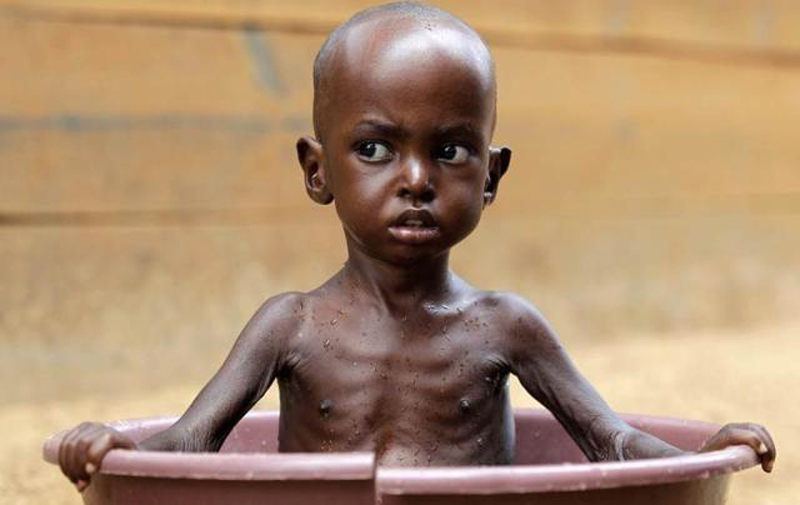I recently had the misfortune of encountering an article by one Peter Guirguis titled “3 Strange But True Reasons Why God Doesn’t Feed All the Starving Children in The World.” (I will not link to the article because I cannot in good conscience send traffic there, but intrepid readers will be able to find it easily enough.) The author explains in great detail why his god – who, you may recall, is supposedly omnipotent, omniscient, omnibenevolent, and omnipresent – prefers to let children suffer and die in agony through malnutrition rather than put his considerable talent to use to, you know, make some food. Alas that the title is rather misleading, given that the reasons he cites are not strange – at least not to those of us who are used to hearing theists make excuses for the failure of their god to alleviate starvation – and whether or not they are true is a matter of some dispute.
Reason #1: It Isn’t God’s Responsibility to Feed the Starving Children of the World
Of all the times that I have read the Bible from cover to cover, I can’t think of a single Bible verse in which God makes a promise to feed all the starving children in the world.
Well then, since there is no bible verse in which god is quoted as saying, “I promise to feed all the starving children in the world,” that totes lets god off the hook! Of course there are verses in which he promises to sustain us (Isaiah 46:4), prosper us (Jeremiah 29:11), meet all our needs (Philippians 4:13), give us plenty to eat (Joel 2:26), help us (Isaiah 41:13), satisfy the appetites of the righteous (Proverbs 13:25), and give us whatever it is we pray for (Mark 11:24); but apparently those should in no way be misconstrued to infer that god will actually sustain us, meet all our needs, give us plenty to eat, help us, satisfy the appetites of the righteous, or give us whatever it is we pray for. On the issues of what god was in fact promising in these passages and why he is seemingly constrained to doing only that which he explicitly promised, Guirguis remains silent.
He then goes on to spout the usual nonsense about how it is our job, not god’s, to feed starving children. Never mind that the majority of humans on earth live under circumstances that preclude their ability to influence whether, how, or where food is grown and distributed: They themselves live in or near poverty; or suffer food insecurity of their own; or lack access to information or freedom of movement or other resources; or haven’t the skills or power to implement political and scientific programs to improve food production and distribution; and so on. For most of us with the ability to take some action, the extent of what we can reasonably do is donate to the local food pantry or give money to NGOs, neither of which is going to eradicate hunger. Oh, and how humans were supposed to harvest, preserve, transport, and distribute adequate food across the globe to famine-stricken areas before the advent of modern technology (i.e., for the nearly the whole of human history) is anyone’s guess.
Reason #2 – God Isn’t Like Humans
Atheists make a mistake when they say things like, “If I saw a starving child and had the power to feed him and I don’t, then I am evil. That’s the same thing with God, He is evil because He has the power to feed starving children and He doesn’t.” The mistake that atheists make here is that they compare themselves to God, or they compare God to themselves. They put themselves in God’s shoes. God’s goals are different than our goals. His purposes are different than our purposes. His way of justice is different than the human way of justice.
This is the claim that theists always make when confronted with the problem of evil: That we can’t apply our own standards of morality to god, which of course begs the question: Why not? And why, if nearly all reasonable and morally normal people would feed starving children if they had the power to do so, and many (if not most) theists at some point struggle with why their god does not do so, is the ethical instinct of all humankind chucked out the window and deemed inferior to a god whose actions are manifestly unethical? Furthermore, this is not so much a reason why god doesn’t feed starving children as it is an admonishment that we should not ask for one.
Reason #3 – God’s Justice is Coming Soon For All
While God does see hate crimes, rapes, and murders as sins, He also sees lying, cheating, and hating people as sins too. So since God is a just God, then He’s going to have to give justice to all if He were to judge the world today. That means that there would be a lot of people who would receive punishment for eternity for breaking God’s standards. So instead, God is saving His judgment for Judgment Day . . . So when you don’t see justice taking place immediately, it’s because God is giving everyone a chance to repent, and put their faith in Jesus Christ as Lord and Savior.
There is a great deal with that statement that is problematic, the most obvious being that it is entirely irrelevant to the question of why god does not feed starving children – unless Guirguis is saying that since Judgment Day will happen someday, there’s no point in feeding starving kids in the meantime. Regardless, it is yet more transparent rationalization of god’s inaction: “It may seem like he isn’t doing anything, but that’s just because he isn’t doing anything right now. He has to wait and see how many more people will come groveling to him before he decides he’s ready to get his Armageddon on.” In other words, we can’t see god’s ethics, and we can’t see his mercy, and we can’t see his love, and we can’t see his justice, but we still somehow know he is ethical, merciful, loving, and just, so let’s all just accept suffering as inevitable in the meantime and STFU.
Let me be clear that I am not refuting the good Mr. Guirguis because I am seeking to refute the existence of god. Indeed, the god hypothesis has been resoundingly refuted (or at least sufficiently challenged) by many others before me so I have no need or desire to re-invent that wheel. My point is rather that religion – especially the Abrahamic ones – require people to question and suppress their own innate senses of right and wrong, empathy, and compassion in order to reconcile the action (or more accurately the inaction) of their deity. It desensitizes people to suffering and injustice – after all, if god is allowing it, he must have a reason, so who are we to argue? I can only hope that one day people will decide that if god is allowing suffering, maybe it’s his ethics that are questionable, and proceed to embrace and heed their own conscience.










What did you think of this article?